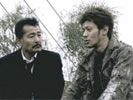Eye For Film >> Movies >> Bright Future (2003) Film Review
Beautiful, fragile, free-floating and amorphous, jellyfish seem to exude a brilliant lustre all of their own, and are inscrutably mysterious to any but their own kind - try to get too close, however, and they are liable to deliver a killer sting. These creatures feature aplenty in Kiyoshi Kurosawa's Bright Future, but in this allegory of delinquency, metamorphosis and lost dreams, the underwater molluscs come to symbolise youth itself, in all its beguiling ephemerality and unpredictable aggression.
Though already 24 years old, Yuji Nimura (Jô Odagiri) is far from grown up - a feckless, dreamy punk, who oozes adolescent resentment while never speaking in more than the occasional monosyllable. He does casual work at an industrial towel-drying busuiness, and spends all his free time hanging out with workmate Mamoru Arita (Tadanobu Asano), a more confident but no less conspiratorial 27-year-old who, for reasons of his own, is gradually adapting his venomous pet jellyfish to fresh water conditions. Attracted to the boys' youth, their middle-aged boss, family man Mr Fujiwara (Takashi Sasano), awkwardly attempts to insinuate himself into their lives, with unexpectedly tragic and shocking consequences.

Left alone with only Mamoru's jellyfish for company, Yuji is vulnerable and helpless, and soon lashes out violently - but then he meets Mamoru's estranged father Shin'ichiro (Tatsuya Fuji), a repairer of outmoded electrical goods, who offers the young man stability, purpose, and even love. Yuji vacillates between teen delinquency and adult responsibility - but then both men find themselves haunted by Mamoru's dream of a rather different future, bright, alluring and dangerous.
Like the split screen that artificially divides driver from passenger in the scenes set in Shin'ichiro's pick-up truck, Bright Future is a film of two distinct, but connected halves - the first documenting Yuji's arrested state of infantilism, the second chronicling his uneasy coming of age. These halves also roughly correspond to a dual set of hand signals that Mamoru creates for the pliant Yuji, one indicating 'wait', the other 'go ahead'. Yet the film is no straightforward rite of passage, but a complex reverie on the male tendency to cling to youth at all costs. The two young men refuse to act their age, their boss parasitically seeks out their companionship and music, Mamoru's father nostalgically restores the objects and furnishings of his own childhood, and Mamoru's pet project becomes his friend's and his father's obsession. Boys, after all, will be boys.
The film's bleached-out imagery, aloof camerawork and gritty setting (on Tokyo's semi-rural outskirts) might all suggest the tropes of realist cinema, but in truth Bright Future, with its dreams, ghosts and mystery, is entirely sui generis - no less enigmatic, broad-reaching and majestically paced than a jellyfish. If you are a fan of the elliptical and the surreal, and you were once young, then you will love this truly original excursion into the male adolescent psyche. Anyone else should handle with caution to avoid getting stung.
Reviewed on: 21 Nov 2007



















